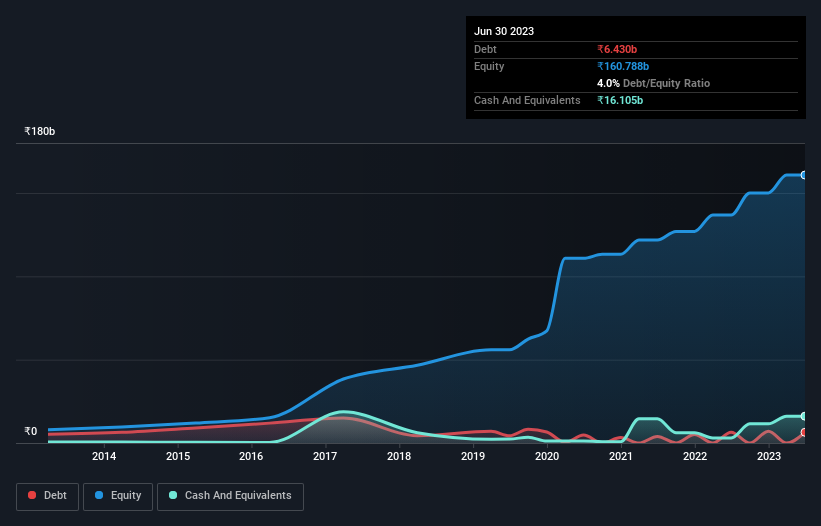- India
- /
- Food and Staples Retail
- /
- NSEI:DMART
These 4 Measures Indicate That Avenue Supermarts (NSE:DMART) Is Using Debt Reasonably Well

Legendary fund manager Li Lu (who Charlie Munger backed) once said, 'The biggest investment risk is not the volatility of prices, but whether you will suffer a permanent loss of capital.' It's only natural to consider a company's balance sheet when you examine how risky it is, since debt is often involved when a business collapses. Importantly, Avenue Supermarts Limited (NSE:DMART) does carry debt. But should shareholders be worried about its use of debt?
When Is Debt A Problem?
Generally speaking, debt only becomes a real problem when a company can't easily pay it off, either by raising capital or with its own cash flow. Ultimately, if the company can't fulfill its legal obligations to repay debt, shareholders could walk away with nothing. However, a more frequent (but still costly) occurrence is where a company must issue shares at bargain-basement prices, permanently diluting shareholders, just to shore up its balance sheet. Having said that, the most common situation is where a company manages its debt reasonably well - and to its own advantage. When we examine debt levels, we first consider both cash and debt levels, together.
View our latest analysis for Avenue Supermarts
What Is Avenue Supermarts's Net Debt?
The chart below, which you can click on for greater detail, shows that Avenue Supermarts had ₹6.43b in debt in March 2023; about the same as the year before. But on the other hand it also has ₹16.1b in cash, leading to a ₹9.68b net cash position.

How Healthy Is Avenue Supermarts' Balance Sheet?
According to the last reported balance sheet, Avenue Supermarts had liabilities of ₹14.7b due within 12 months, and liabilities of ₹5.61b due beyond 12 months. Offsetting these obligations, it had cash of ₹16.1b as well as receivables valued at ₹2.65b due within 12 months. So its liabilities outweigh the sum of its cash and (near-term) receivables by ₹1.52b.
This state of affairs indicates that Avenue Supermarts' balance sheet looks quite solid, as its total liabilities are just about equal to its liquid assets. So while it's hard to imagine that the ₹2.42t company is struggling for cash, we still think it's worth monitoring its balance sheet. While it does have liabilities worth noting, Avenue Supermarts also has more cash than debt, so we're pretty confident it can manage its debt safely.
Fortunately, Avenue Supermarts grew its EBIT by 9.5% in the last year, making that debt load look even more manageable. When analysing debt levels, the balance sheet is the obvious place to start. But it is future earnings, more than anything, that will determine Avenue Supermarts's ability to maintain a healthy balance sheet going forward. So if you're focused on the future you can check out this free report showing analyst profit forecasts.
Finally, while the tax-man may adore accounting profits, lenders only accept cold hard cash. Avenue Supermarts may have net cash on the balance sheet, but it is still interesting to look at how well the business converts its earnings before interest and tax (EBIT) to free cash flow, because that will influence both its need for, and its capacity to manage debt. Considering the last three years, Avenue Supermarts actually recorded a cash outflow, overall. Debt is far more risky for companies with unreliable free cash flow, so shareholders should be hoping that the past expenditure will produce free cash flow in the future.
Summing Up
While it is always sensible to look at a company's total liabilities, it is very reassuring that Avenue Supermarts has ₹9.68b in net cash. On top of that, it increased its EBIT by 9.5% in the last twelve months. So we don't have any problem with Avenue Supermarts's use of debt. The balance sheet is clearly the area to focus on when you are analysing debt. However, not all investment risk resides within the balance sheet - far from it. For example - Avenue Supermarts has 1 warning sign we think you should be aware of.
Of course, if you're the type of investor who prefers buying stocks without the burden of debt, then don't hesitate to discover our exclusive list of net cash growth stocks, today.
New: Manage All Your Stock Portfolios in One Place
We've created the ultimate portfolio companion for stock investors, and it's free.
• Connect an unlimited number of Portfolios and see your total in one currency
• Be alerted to new Warning Signs or Risks via email or mobile
• Track the Fair Value of your stocks
Have feedback on this article? Concerned about the content? Get in touch with us directly. Alternatively, email editorial-team (at) simplywallst.com.
This article by Simply Wall St is general in nature. We provide commentary based on historical data and analyst forecasts only using an unbiased methodology and our articles are not intended to be financial advice. It does not constitute a recommendation to buy or sell any stock, and does not take account of your objectives, or your financial situation. We aim to bring you long-term focused analysis driven by fundamental data. Note that our analysis may not factor in the latest price-sensitive company announcements or qualitative material. Simply Wall St has no position in any stocks mentioned.
About NSEI:DMART
Avenue Supermarts
Engages in the business of organized retail and operating supermarkets under the D-Mart brand name in India.
Flawless balance sheet with reasonable growth potential.


